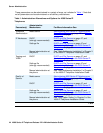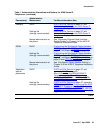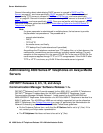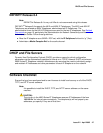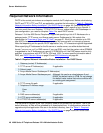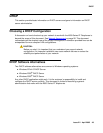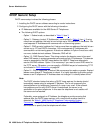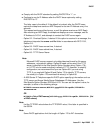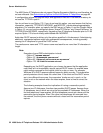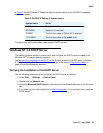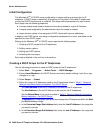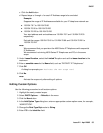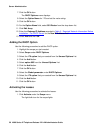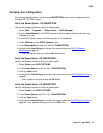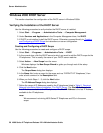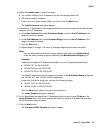
Server Administration
52 4600 Series IP Telephone Release 2.2 LAN Administrator Guide
The 4600 Series IP Telephones do not support Regular Expression Matching, and therefore, do
not use wildcards. See Administering Options for the 4600 Series IP Telephones
on page 80.
In configurations where the upgrade script and application files are in the default directory, do
not use the TFTPDIR=<path>.
You do not have to use Option 176. If you do not use this option, you must ensure that the key
information, especially TFTPSRVR, MCIPADD, and MCPORT, is administered appropriately
elsewhere. For example, when you specify the DNS server in Option 6, and the Domain Name
in Option 15, you can use the configured names “AvayaTFTPServer” and “AvayaCallServer” for
TFTPSRVR and MCIPADD, respectively. Upgrading from IP telephone Releases prior to R1.60
requires Option 176 to be minimally administered with MCIPADD.
Administer DHCP servers to deliver only the options specified in this document. Administering
additional, unexpected options might have unexpected consequences, including possibly
causing the IP telephone to ignore the DHCP server.
The media server name and TFTP server name must each be no more than 32 characters in
length.
Note:
Note: Examples of good DNS administration include:
- Option 6: “aaa.aaa.aaa.aaa”
- Option 15: “dnsexample.yourco.com”
- Option 66: “tftpserver.yourco.com,zzz.zzz.zzz.zzz”
- Option 176: “MCIPADD=xxxx.xxx.xxx.xxx”
Depending on the DHCP application you choose, be aware that the application
most likely will not immediately recycle expired DHCP leases. An expired lease
might remain reserved for the original client for a day or more. For example,
Windows NT
®
DHCP reserves expired leases for about one day. This reservation
period protects a client’s lease for a short time. If the client and the DHCP server
are in two different time zones, the computers’ clocks are not in synch, or the
client is not on the network when the lease expires, there is time to correct the
situation.
The following example shows the implication of having a reservation period:
Assume two IP Addresses, therefore two possible DHCP leases. Assume three
IP telephones, two of which are using the two available IP Addresses. When the
first two telephones’ lease expires, the third telephone cannot get a lease until the
reservation period expires. Even if the other two telephones are removed from
the network, the third phone remains without a lease until the reservation period
expires.



